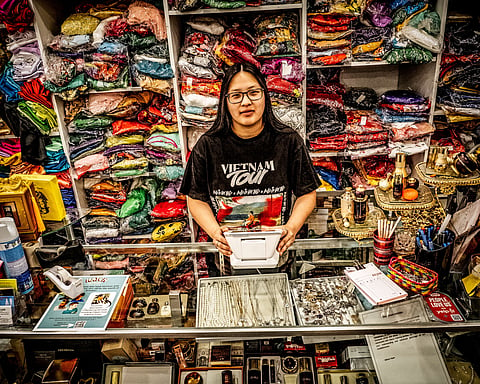Unbroken Threads, Part 3: Stitching Together a Family Legacy
Part 3: Stitching Together a Family Legacy
Tiffany Nguyen values the business — and life — her family has created. In the early 1980s, her grandfather Be fled Vietnam. With borrowed money, he started Adam Tailor, a tailoring business in Pioneer Square.
When his wife Nhung and children joined him in 1990, they worked together in a 500-square-foot space. Years later, Nhung took her talents to the Central District, eventually leading to the purchase of a new property for a second Adam Tailor on Rainier Avenue South in Columbia City. It's an immigrant business that's lasted more than 40 years.
But Adam Tailor is more than a business: The rear of the house serves as a temporary home for siblings and other family members arriving in the U.S. from Vietnam.
Walking past the ironing boards, sergers, sewing machines, and a fitting room, Tiffany enters a back living area. There, some members of the extended Nguyen family prepare a meal. An uncle drops by to pick up a package, sharing some quick updates in his native Vietnamese. Over the past three decades, nearly 30 people from the extended Nguyen family have called the building that houses Adam Tailor home.
Tiffany describes their home as "a hotel with a revolving door."
But joking aside, Tiffany, the first native English speaker in her extended family, understands the business has altered the lives of dozens of people, including her own.
Grandmother Nhung's Promise
Back when Grandmother Nhung lived in Vietnam, her parents worked as pig farmers. They helped Nhung when they could, lending her money so she could pay off corrupt officials as well as the smugglers who eventually helped her to escape.
Family ties were strong, so before Nhung left Vietnam, she made a pledge to her parents: She would do whatever it took to keep the family together and to create a better life for family members remaining in Vietnam.
For Nhung's immediate family who escaped the Southeast Asian nation, that involved working alongside her husband, Be, and her children at Adam Tailor in Seattle. For the extended family, a third of the way around the globe, that involved paperwork.
The Nhung family in Seattle attempted to sponsor family members in Vietnam to come to the United States. From the time they submitted their first application, 15 years passed before one was approved. Nhung was eventually able to sponsor eight of her 13 siblings, along with other relatives, to come to the Seattle area.
Such a landing pad in the U.S. meant relatives were able to secure jobs. They've served in various professions, including as a custodian, driver, nail technician, X-ray tech, restaurant manager, tech engineer, and of course, tailor.
Some of the first-generation children of the Nguyen family to emigrate to the region attended Seattle schools and eventually colleges and trade schools to study accounting, medicine, and mechanical engineering. Others took on service jobs.
But instead of continuing on in the tailoring business, Tiffany pursued other educational plans — until a needle got in the way.
Keeping the Stories Alive
For years, Tiffany seemed destined to head in a different direction with her career. She enrolled at Bellevue College, where she studied neurodiagnostics, with a goal of entering the medical profession. But a fear of needles sidelined that plan.
"The needles that go into you," she clarifies.
Several years ago, Grandmother Nhung began to experience cardiac issues, which required surgery. Tiffany paused her schooling so she could help the family around the shop and take her grandmother to medical appointments. Tiffany still works side by side with her mother and grandmother at Adam Tailor.
At the shop and elsewhere, Tiffany interprets for her mom and grandmother. Scouring through family photos, she translates stories her family tells, though Tiffany has a few of her own.
She has traveled back to Vietnam every year since she was 2. While in Ho Chi Minh City, Tiffany connects with relatives and helps raise money to share with unsheltered elderly people and children in the country.
"Some of the people in the streets live on 78 cents a day," Tiffany says, flipping through pictures of a recent trip. "I feel so much compassion for the people we are able to help." The compassion is a trait she picked up from her grandmother, one that's been passed down through three generations.
While she still considers a possible change in her career, for now, she's committed to the shop and her family.
"It was a difficult few years while I was in school," Tiffany says, recalling family health issues that forced her away from her studies. "But I believe there's a reason for everything that happens to you. I'm here to help keep our family shop going and to keep the stories of my grandparents and mother alive."
If you missed Part 1, you can find it linked below.
If you missed Part 2, you can find it linked below.
This article is published under a Seattle Human Services Department grant, “Resilience Amidst Hate,” in response to anti-Asian American, Native Hawaiian, and Pacific Islander violence.
Help keep BIPOC-led, community-powered journalism free — become a Rainmaker today.


